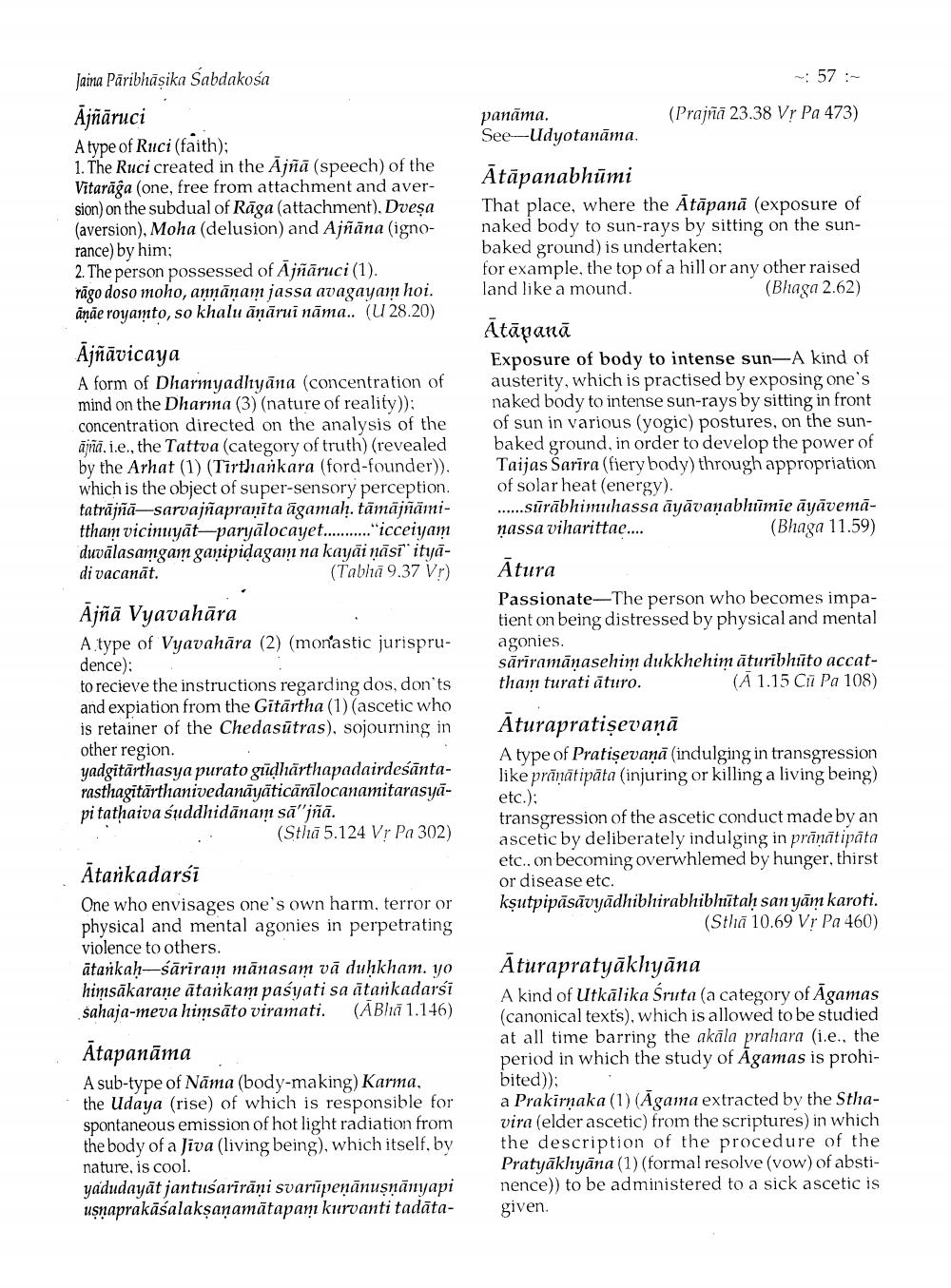________________
57:
(Prajna 23.38 Vr Pa 473)
рапата. See-Udyotanāma.
Jaina Pāribhāşika Sabdakosa Ājñāruci A type of Ruci (faith); 1. The Ruci created in the Ajñā (speech) of the Vitarāga (one, free from attachment and aversion) on the subdual of Rāga (attachment), Dveça (aversion), Moha (delusion) and Ajñāna (ignorance) by him; 2. The person possessed of Ajnāruci (1) rägo doso moho, annāņam jassa avagayam hoi. ānāe royamto, so khalu āņārui nāma.. (U 28.20)
Ātāpanabhūmi That place, where the Ātāpanā (exposure of naked body to sun-rays by sitting on the sunbaked ground) is undertaken; for example, the top of a hill or any other raised land like a mound.
(Bhaga 2.62)
Ajñāvicaya A form of Dharmyadlıyāna (concentration of mind on the Dharina (3) (nature of reality)); concentration directed on the analysis of the ārā, i.e., the Tattva (category of truth) (revealed by the Arhat (1) (Tirthankara (ford-founder)). which is the object of super-sensory perception tatrājñā-sarvajñapranita āgamah. tāmājnämittham vicinuyāt-paryālocayet...........icceiyam duvālasamgam ganipidagam na kayāiņāsi“ ityādi vacanāt.
(Tabha 9.37 Vr)
Ātāpanā Exposure of body to intense sun-A kind of austerity, which is practised by exposing one's naked body to intense sun-rays by sitting in front of sun in various (yogic) postures, on the sunbaked ground, in order to develop the power of Taijas Sarira (fiery body) through appropriation of solar heat (energy). ......sūrābhimuhassa āyāvanabhumie āyāvemānassa viharittae....
(Bhaga 11.59)
Atura Passionate-The person who becomes impatient on being distressed by physical and mental agonies. säriramānasehim dukkhehim āturibhuto accattham turati āturo.
(Ā 1.15 Cū Pa 108)
Ājñā Vyavahāra A type of Vyavahāra (2) (monastic jurisprudence): to recieve the instructions regarding dos, don'ts and expiation from the Gitārtha (1) (ascetic who is retainer of the Chedasūtras), sojourning in other region. yadgitārthasya purato giidharthapadairdeśāntarasthagitārthanivedanāyāticārālocanamitarasyäpi tathaiva suddhidānam sā''jñā.
(Sthā 5.124 Vr Pa 302)
Aturapratisevaņā A type of Pratisevaņā (indulging in transgression like prānätipāta (injuring or killing a living being) etc.); transgression of the ascetic conduct made by an ascetic by deliberately indulging in prānātipāta etc.. on becoming overwhlemed by hunger, thirst or disease etc. kṣutpipāsāvyādhibhirabhiblütah san yām karoti.
(Sthā 10.69 Vr Pa 460)
Ātarkadarsi One who envisages one's own harm, terror or physical and mental agonies in perpetrating violence to others. ätankah-särirain mānasam vā duhkham. yo himsākarane ātankam paśyati sa ātankadarsi sahaja-meva himsāto viramati. (ABlä 1.146)
Atapanāma A sub-type of Nāma (body-making) Karma, the Udaya (rise) of which is responsible for spontaneous emission of hot light radiation from the body of a Jiva (living being), which itself, by nature, is cool. yadudayāt jantuśarīrāņi svarūpeṇānuşnānyapi uşnaprakāśalakṣaṇamātapam kurvanti tadāta
Āturapratyākhyāna A kind of Utkālika Śruta (a category of Āgamas (canonical texts), which is allowed to be studied at all time barring the akāla prahara (i.e., the period in which the study of Agamas is prohibited)); a Prakirnaka (1) (Agama extracted by the Sthavira (elder ascetic) from the scriptures) in which the description of the procedure of the Pratyāklıyāna (1) (formal resolve (vow) of abstinence)) to be administered to a sick ascetic is given




